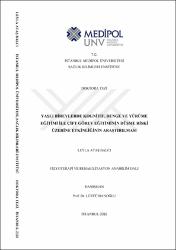| dc.contributor.advisor | Hanoğlu, Lütfü | |
| dc.contributor.author | Ataş, Leyla | |
| dc.date.accessioned | 2021-05-26T12:00:03Z | |
| dc.date.available | 2021-05-26T12:00:03Z | |
| dc.date.issued | 2016 | en_US |
| dc.date.submitted | 2016-12-30 | |
| dc.identifier.citation | Ataş, L. (2016). Yaşlı bireylerde kognitif denge ve yürüme eğitimi ile çift görev eğitiminin düşme riski üzerine etkinliğinin araştırılması. (Yayınlanmamış doktora tezi). İstanbul Medipol Üniversitesi Sağlık Bilimleri Enstitüsü, İstanbul. | en_US |
| dc.identifier.uri | https://hdl.handle.net/20.500.12511/6938 | |
| dc.description.abstract | Düşme riskinin azaltılmasında; etkili egzersiz tipi ve dozu halen belirlenememiştir. Çalışmamızda yaşlı bireylerde çift görev eğitimiyle kognitif, denge ve yürüme eğitiminin kombinasyonunun düşme riski, kognitif performans, emosyonel durum, fonksiyonellik ve yaşam kalitesine etkilerinin değerlendirilmesi amaçlanmıştır. Çalışmaya 45 gönüllü (8 erkek, 39 kadın; yaş aralığı: 65-83 yıl) katılmış; kontrol (denge ve yürüme), çift görev eğitimiyle (denge ve yürümeyle eş zamanlı kognitif aktivite) farklı zamanlarda denge, yürüme ve kognitif eğitim (denge, yürüme ve kognitif eğitim) grupları oluşturulmuştur. Tüm deneklere 4 haftalık eğitim periyodunun öncesinde ve sonrasında, denge ve yürüme değerlendirmesi için; Süreli Kalk Yürü Testi, Tinetti’nin Düşme Etkinlik Ölçeği, Berg Denge Ölçeği, tek görev 10 metre yürüme hızı testi, çift görev 10 metre yürüme hızı testi, bilişsel işlevlerin değerlendirilmesi için; Standardize Mini Mental Test, Stroop testi, sözel akıcılık testleri, saat çizim testi, Luria testleri; beyin bölgesel kan akımı ölçümü için fNIRS; günlük yaşam aktiviteleri ve yaşam kalitesi değerlendirilmesi için; Geriatrik depresyon ölçeği, Pittsburgh uyku kalitesi ölçeği, Yaşlılar için Dünya Sağlık Örgütü Yaşam Kalitesi Modülü ve Lawton ve Brody enstrümantal günlük yaşam aktiviteleri anketi uygulanmıştır. Araştırmamız, düşme risk faktörleri, denge becerileri, bilişsel beceriler ve yaşam kalitesinde çift görev eğitimi ve farklı zamanlarda kognitif, denge ve yürüme eğitiminin etkili uygulamalar olduğunu göstermiştir. Hem klinik ölçekler, hem de fNIRS analizleri yoluyla nörobiyolojik olarak, farklı zamanlarda yapılan egzersiz ve kognitif görevlerin söz konusu parametreler üzerinde en fazla geliştirici etki gösteren yöntem olduğu gösterilmiştir. Ancak, söz konusu protokolün etkinliğinin desteklenmesi için geniş ölçekli ve uzun dönem etkilerini saptayabilecek çalışmalara ihtiyaç vardır. | en_US |
| dc.description.abstract | Dose and type of effective exercise to decrease fall risk has not determined yet. It is aimed to assess effects of dual task training and combination of cognitive, balance and gait training on fall risk, cognitive performance, emotional status, functionality and quality of life. Forty five volunteers were recruited (8 male; 39 female; age range 65-83 years). Control (balance and gait), dual task training (cognitive activity simultaneous with balance and gait), balance, gait and cognitive training at different times (balance, gait and cognitive training) groups were established. It was applied to all participants for assessing of balance and gait Timed up and Go test, Tinnetti's Fall Efficacy Scale, Berg Balance Scale, single task 10 meter gait speed test and dual task 10 meter gait speed test; for assessing of cognitive functions Standardized Mini Mental Test, Stroop test, Verbal Fluency Tests, Clock Drawing test and Luria tests; for assessing of local blood flow of brain fNIRS; for assessing of activities of daily living and quality of life Geriatric depression scale, Pittsburgh Sleep Quality Index, WHOQOL-OLD, Lawton and Brody instrumental daily living activities scale, before and after 4 weeks of interventions. Our research was showed that dual task training and cognitive, balance and gait training at the different times of day were effective interventions on risk factors of falls, balance abilities, cognitive functions and quality of life. It has been showed that cognitive, balance and gait training at the different times of day was the most improving methods on the parameters of subjects via both clinical scales and neurobiologically by fNIRS analysis. However, it is required to do the studies that can detect large-scale and long-term effects to support the effectiveness of the protocol. | en_US |
| dc.language.iso | tur | en_US |
| dc.publisher | İstanbul Medipol Üniversitesi Sağlık Bilimleri Enstitüsü | en_US |
| dc.rights | info:eu-repo/semantics/openAccess | en_US |
| dc.subject | Düşmeler | en_US |
| dc.subject | Spektroskopi | en_US |
| dc.subject | Yakın-Kızılötesi | en_US |
| dc.subject | Yaşlı | en_US |
| dc.subject | Yürüme | en_US |
| dc.subject | Elderly | en_US |
| dc.subject | Falls | en_US |
| dc.subject | Near-Infrared | en_US |
| dc.subject | Spectroscopy | en_US |
| dc.subject | Walking | en_US |
| dc.title | Yaşlı bireylerde kognitif denge ve yürüme eğitimi ile çift görev eğitiminin düşme riski üzerine etkinliğinin araştırılması | en_US |
| dc.title.alternative | Investigation of effects of cognitive, balance and walking education with dual task training on fall risk in elderly | en_US |
| dc.type | doctoralThesis | en_US |
| dc.department | İstanbul Medipol Üniversitesi, Sağlık Bilimleri Enstitüsü, Fizyoterapi ve Rehabilitasyon Ana Bilim Dalı | en_US |
| dc.relation.publicationcategory | Tez | en_US |


















